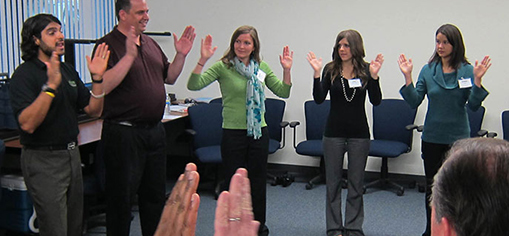Improving Leadership for Nonprofits
 Guest Blog by Alex Greenland & Akshay Sateesh, Ziksana
Guest Blog by Alex Greenland & Akshay Sateesh, Ziksana
Join Alex Greenland for the Emerging Leaders Program beginning December 5, 2014, an extraordinary opportunity to build the long-term sustainability of your nonprofit by investing in leadership capacity!
Read the original blog here.
There are plenty of people who take improv classes all over the world. Each of them will play similar games, and learn similar philosophies about what makes a scene successful and how best to support their scene partners. After months or years of classes, they’ll tattoo “Yes, And” into their brains, they will arm themselves with character and scene work techniques, and they’ll be ready to tackle the improv world.
And they’ll be fine, but they won’t be great. They’ll be funny, but they won’t be hilarious. They’ll be interesting, but they won’t be inspiring.
So what makes an improviser really great? Well, it isn’t a dynamite character, or a funny voice, or even agreeing with your scene partner in every scene. The answer to what makes an improviser great, in one word, is openness. Being open isn’t a skill that improvisation often teaches, but instead it is a mindset that is offered to every improviser during his or her tenure. Being open means to let other perspectives in, allow them to affect you, and be influenced by them. It doesn’t mean to let go of who you are or what you think. It means to allow others into the way you think, the way you feel, and the way you are, and be curious about how others think and feel, and discover who other people are.14
Every great improviser I have ever seen, or met, or worked with, has had this trait. It is what helps the actor be fearless onstage and appreciative of their troupe members and the scenes they’re in. Improv can be a great tool for leaders to experience and practice this openness and take the new learnings and behaviors back to their organizations to create the culture they’ve always wanted. Openness strengthens important leadership competencies like authenticity, collaboration, interpersonal intelligence, courageous authenticity, and team play.* Here are 3 core ways that practicing openness through improv can be transformative for leaders and organizations:
1. Open Mind
An open improviser is one who will allow for countless new possibilities and is not afraid to go into uncharted territory. An open mind also means being able to take feedback, learn one’s own limitations, and get input from teammates on how to serve the group in a more effective way. Seeing the value in other people and their perspectives and perceptions are key leadership traits. This open mind is vital for leaders to continually be improving and surround themselves with people who are more talented than they are.
2. Open Heart
The best improvisers are honest and react honestly. That means that not only do they share their own authentic point of view, but they also are open to being influenced by others. Improv can be great practice for empathy, and accepting people for who they are and appreciating their points of view. This sense of open hearted presence and awareness are crucial to the effectiveness of a leader. Being honest is a courageous act, and one that counters fear of being who we are and sharing what we think. Great leaders are courageous and have an open heart that both reveals courage and fear.
3. Open Community
The best improvisers are always thrilled to hear about other shows and troupes, and are genuinely interested in other ways people are doing improv. They support and encourage others, offer free advice and guidance, teach classes for new students, and help build their improv community. This goes beyond just networking – it is about building lasting relationships for their own sake. Improvisers truly believe that helping others will enhance the whole community and these acts of kindness and giving eventually come back in a positive form to the originator. Great leaders act for others and care about the larger community beyond their own organization. Businesses that last for generations are always consciousness of their impact in the world.
Behaviors and traits from improvisers and the improvisation community can serve as a rich learning environment for the corporate world. Fostering openness of mind, heart, and community, is a leadership trait that is enacted or offered to every improviser in the improv community. Openness will eventually lead to a renewal of a learning mindset that will in turn empower leaders (and improvisers) to be more fulfilled and joyous in the workplace.
![]() Join Maryland Nonprofits’ 2014 Annual Conference “Connecting for Impact!” November 5th at the Universities of Shady Grove in Rockville, MD.
Join Maryland Nonprofits’ 2014 Annual Conference “Connecting for Impact!” November 5th at the Universities of Shady Grove in Rockville, MD.
Connect with Maryland Nonprofits on Facebook, Twitter, LinkedIn, and Google+, tell us what you think and what kind of topics you would like to see more of on our blog.
![]() Find the perfect nonprofit career this summer, follow @MDNonprofitJobs
Find the perfect nonprofit career this summer, follow @MDNonprofitJobs
